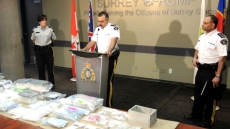A First Nations chief says the deaths of nine people in a house fire on a remote northern Ontario reserve should spur the federal government to improve what he says are third-world conditions on dozens of reserves.
"We can't let these people die in vain," Isadore Day with the Chiefs of Ontario said Thursday.
"There should be a direct and immediate response to this situation. This is typical across all First Nations that are living in third-world conditions."
A blaze that erupted in a family home late Tuesday night on the Pikangikum reserve killed six adults and three children.
Ontario Provincial Police said investigators and a stress team were in the community, but finding the cause of the blaze could take "a week or more."
A fundraising page created by a community member identified the dead as Gilbert and Annette Strang, their daughter Faith, Faith's husband Dietrich Peters and the younger couple's three children — Ireland, 4, Aubree, 2, and eight-month-old Amber.
The Strangs' son Gilbert and his wife Sylvia Peters also died in the fire, it said.
Previous inquests into similar tragedies have highlighted the challenges facing remote northern reserves such as Pikangikum.
Homes are dilapidated, not built to comply with any modern code and often don't have running water, let alone a smoke detector. There are often several generations of families sharing a tiny bungalow, heightening the potential toll fires can take when they break out.
"Most homes are simply a death trap," Day said.
Any fires spread quickly and communities are often woefully unprepared. Many don't have fire trucks and rely on water trucks with no more pressure than a garden hose. If a community is lucky enough to have a fire truck, there are often not enough trained volunteers to operate it properly, inquests and internal government reports have found.
Day said more than 90 per cent of homes don't have running water in Pikangikum.
"Is there going to be a fire hydrant outside? No, there isn't."
Indigenous Affairs Minister Carolyn Bennett said Thursday the deaths underscore the need to improve living conditions on reserves.
"We are with them," she said. "My job always is to do everything in our power to prevent the preventable."
Federal Health Minister Jane Philpott, in Toronto meeting with her Ontario counterpart and First Nations leadership, said there's a need for action on housing and fire services.
"We need to make sure ... that it's not going to happen again and we're not going to hear these stories again," she said after the meeting.
Bennett said money in the recent federal budget will help improve the deplorable state of reserve housing. But she couldn't say when a community such as Pikangikum could expect vastly improved living standards.
"We are in the process of beginning that, one step at a time," Bennett said. "In places like Pikangikum, there is a demonstrated need that it's a high priority."
National Chief Perry Bellegarde of the Assembly of First Nations said the federal budget was a good start to make up for decades of neglect. Too many indigenous people are dying in fires that are completely preventable, he said.
"How many more deaths have to happen before action is implemented? It's not acceptable in 2016."
An internal federal government report examining insurance coverage for First Nations found almost half across Canada had "little to no fire protection" and relied too heavily on poorly trained volunteer firefighters.
The 2011 report, obtained by The Canadian Press through access-to-information legislation, found fire rates for First Nations were 2.4 times higher than for the rest of Canada. First Nations residents were also 10 times more likely to die in a house fire than someone living off reserve.
Last year, a Manitoba judge examining the deaths of three children and a grandfather in house fires on remote northern reserves recommended all First Nations communities have 911 service. Judge Tracey Lord also recommended better co-ordinated firefighting training and greater priority of fire safety inspections.
Federal NDP critic Charlie Angus, who represents a vast northern Ontario riding, said inquests into similar fires in Ontario have also laid out a road map for prevention.
"It needs political will," he said. "What we need out of this tragedy is a message that the days of leaving the safety of children to chance are over."
In Pikangikum, community members tried to come to grips with what one member described as one of the worst events in a long, troubled history.
Education director Kyle Peters said hundreds of mourners gathered near the charred remains of the home Wednesday night for a vigil. People lit floating lanterns and strung candles around the fire scene.
There was "a lot of sadness and tears and people trying to realize that it actually happened," said Peters, who added that members of the victims' families were due to arrive in Pikangikum later Thursday.
Funeral and memorial arrangements are not likely to be made until next week, he said.




